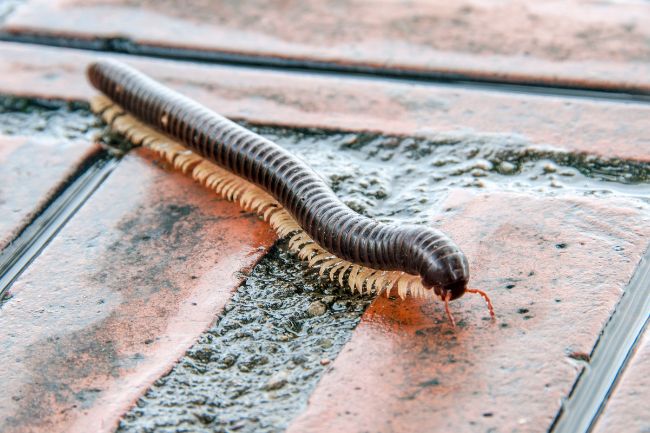While millipedes can technically enter your ear, it is highly unlikely they would do so.
Contents
Can insects get stuck in a human’s ear?

Sci-fi films are full of horror scenes involving insects or other creepy-crawlies entering into a person’s head through their ears, and usually laying eggs there for good measure. For the majority of people, the very idea will make their skin crawl, and for good reason.
Throughout the world, there are plenty of insects that will happily use the human body as a host, such as a bot fly, which lets its maggots pupate within the skin of its human host.
Many of these parasitic insects can and do cause serious illnesses the world over, such as blindness or even death. No wonder we are so afraid of insects entering our brains through our ears.
| Case | Description |
|---|---|
| Ear Exploration | Millipedes may inadvertently crawl into the ear canal if seeking a dark, moist environment |
| Sleeping on the Ground | People who sleep on the ground, such as campers, have a higher risk of millipede encounters |
| Uncommon and Isolated Cases | Instances of millipedes found in the ear are rare and typically isolated incidents |
But when it comes to the reality of insects entering into ears, the truth is it’s usually a simple error. Emergency rooms the world over are full of people that have flies, spiders or even wasps stuck in their ears. Usually, this is because the animal has accidentally landed in the ear or has gone in for safety, perhaps trying to escape the desperate swipes of its host.
However, what’s important to note is that these animals do not want to be in your ear. There are very few species that would be able to live off what little food they can find in the ear canal. While it may be safe, to a certain extent, dark and damp, it certainly isn’t their preferred home.
Can insects get to the human brain by entering through the ear?
Another common misconception is that once in the ear, an insect could enter your brain, and either lay eggs or start feasting. Firstly, there are very few insects that are interested in human flesh as a meal.
Most parasitic animals are more interested in a tasty blood supper, that they can much more easily reach by piercing the skin on the outside of the body. And while there are a few insects that will lay eggs below our skin, it is again much easier for them to do this from the outside, rather than from within.
Even once within the ear, insects generally can’t get further than the ear canal, which ends at the ear drum. Reaching the brain from this point would be surprisingly difficult, and more easily achieved through the nose if required.
What can happen, if an insect is persistent enough, is damage to the eardrum, which can be painful and severely affect hearing. However, the majority of insects aren’t big enough to cause this kind of damage on their own.
Because of the discomfort and possible injury an insect in an ear can cause, it is always best to seek medical advice if the insect does not emerge on its own. Removal by a doctor or nurse will quickly resolve the issue and prevent any further harm.
Also read: Millipede Life Cycle – Reproduction, Lifespan & More!
Do millipedes go in your ear?

Millipedes come in a range of sizes, from the very small species like the pill millipedes to the very large ones like the giant African millipede. When it comes to fitting into your ear, it would certainly have to be some of the smallest species to even make an attempt.
Yet, for this to occur, a very strange set of circumstances would need to have taken place. Most millipedes like to spend their time in dark and damp places, usually among leaf litter, or under rocks. Many of the species that do accidentally end up in a person’s ear are those that live happily alongside humans, within their homes, such as spiders and flies.
While millipedes might take up residence in your home, it will usually be because there is an issue with dampness. Even with these damp issues, they will usually confine themselves to somewhere dark and hidden, and will not be found wandering across your bed in the middle of the night.
While millipedes are omnivores, meaning they eat both meat and plant matter, they focus on well-rotted items, and living flesh is not something they attempt to eat. Therefore, there is little appeal for a millipede to enter an ear of a still-living human being.
Even if we were to argue that the damp and dark within the ear might attract them, there is still nothing much for them to eat within the ear, making it an unsuitable home. So while some species of millipedes technically could enter your ear, it is highly unlikely they would ever do so.
A species more likely to spend time around humans is the centipede, which is often confused with the millipede, as it has a similar body shape. The main difference between the two is that the centipede has one set of legs per segment, whereas the millipede has two. Centipedes are hunters and will kill and eat other insects.
In some countries, they are known to enter people’s homes looking for other animals that might inhabit them. However, even these creepy-crawlies really have no interest in entering into your ear.
Can you hear me?
Having an animal stuck in your ear can certainly be an annoying and worrying experience when it occurs. Yet imagine what it must be like for the creature within your ear? Not so pleasant. And there are certainly few creatures that make their way in that get to come out alive.
So while we might be terrified of bugs crawling into our ears whilst we sleep, remember that no bug wants to enter your ear. It’s simply an unfortunate accident for everyone involved and not a planned attack in order to suck up the juices of your tasty brain.

